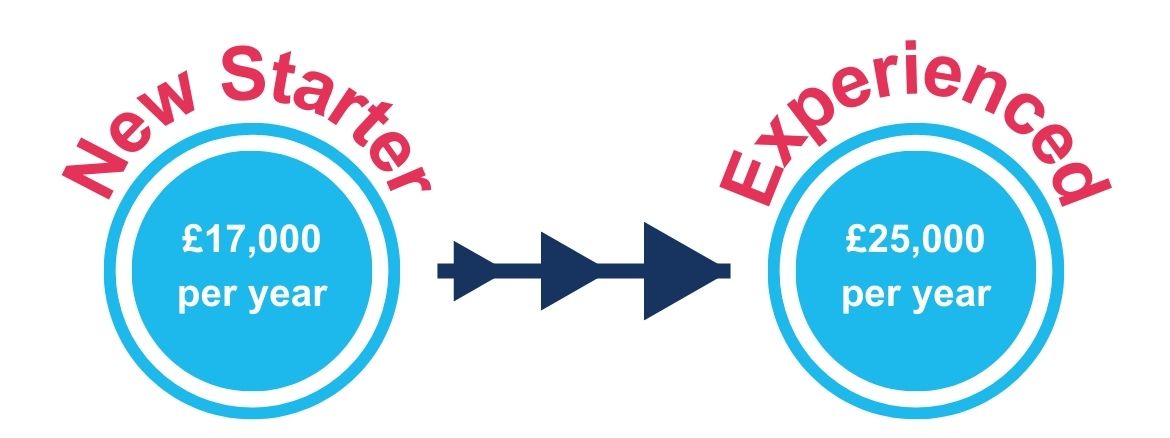A recruitment resourcer may be employed in any organisation that requires a recruitment function. Their role is to identify, attract and shortlist candidates for the recruitment process to fulfil the requirements of the business brief and provide resourcing support to the recruitment function. They may also be required to identify new business opportunities. Typical responsibilities include:
• Research, identify, attract and shortlist candidates
• Identify new business opportunities
• Meet all procedures and carry out relevant processes to comply with code of ethics and legislation.
Course Requirements
You should be 16 or over to undertake the qualification.
Those without level 1 English and maths will need to achieve this level prior to taking the end-point assessment.
- The candidate attraction and selection processes.
- The legal, regulatory and ethical requirements and appropriate codes of practice when resourcing.
- Agreed job related Key Performance Indicators (assessment completed, interviews etc) and how they will be assessed and measured during the apprenticeship.
- Recruitment sales techniques and processes and how to support them.
- Market rates and conditions within their sector. This may include identifying labour market shortages and the demand for those with transferrable skills with the capacity to move from the legacy carbon economy into a green economy job.
- How to initiate, build and maintain relationships with candidates.
- The principles and importance of using research, for resourcing, including:
- Quantitative and qualitative research methods
- Research validity and reliability
- Sources of research information
- The recruitment industry and the principles of the recruitment models
- Employee rights and responsibilities including equality, diversity and inclusion
- Research, identify and attract candidates using all appropriate methods to satisfy job requirements. This may include identifying labour market shortages and the demand for those with transferrable skills with the capacity to move from the legacy carbon economy into a green economy job.
- Write, place and update adverts in line with company procedures
- Monitor responses/applications received and make sure that candidate’s applications are processed efficiently
- Qualify, shortlist and present suitable candidates against defined job vacancies
- Assist in the recruitment and selection processes by effectively liaising with the candidates and internal teams
- Initiate, manage and develop candidate relationships
- Identify and progress leads as required
- Contribute to the development of a recruitment resourcing plan
- Proactively and consistently strive to identify new candidate and client opportunities
- Provide first line support for all enquiries
- Provide pre-employment and compliance checks in line with company policy and relevant legislation
- Provide support to ensure that the candidates and clients receive a professional and comprehensive recruitment service at all times
- Seek and provide feedback in a professional manner at all times to candidates
- Accurately record candidate and client information on the recruitment database
- Utilise database information in line with relevant legislation and best practice
- Escalate non-compliance where appropriate
- Meet agreed Key Performance Indicators (e.g. interviews arranged, candidates sourced etc)
- Self-motivation - Someone who takes independent action to fulfil work tasks
- Tenacity and resilience - Someone who continues to make effective candidate resourcing contacts despite initial setbacks
- Ambition, drive and determination - An individual who is clear on their personal objectives and plans accordingly
- Ability to prioritise and escalate where necessary - Someone who can plan workloads and undertake tasks systematically. If no clear priority is found then they will seek help
- Innovative - Someone who seeks new ways to achieve tasks
- Attention to detail - Accurate data entry of candidate details
- Ethical customer focused approach - An individual who operates under the spirit of codes of practice, ethics and the law
- Are very organised - An organised individual would be able to organise their time in an efficient manner
- Good questioning and listening - Someone who can pay attention, interact and support a conversation, probing for further information when required
Assessment Methods
This is a knowledge based course with practical aspects that will need to be demonstrated.
End-Point Assessment
- Apprentice showcase
- Practical observation
- Professional discussion
Progression Routes
Upon the successful completion of this apprenticeship, why not continue to study this course:






